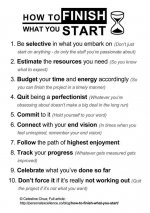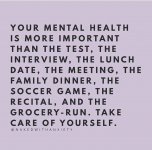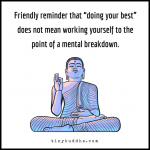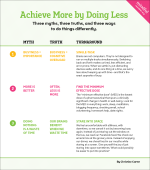Avoiding the Groundhog Day Syndrome
...Doing things for the first time typically leaves a lasting impression (remember your first day of school or a new job?), but as we repeat those events over and over they essentially leave little or no vivid memory, and time seems to fly by. Your life seems to be one series of repetition and boredom - you get into the rut...
To break out of the rut, break down your old routines. Although routines may be familiar and comforting, they also lead to a perception that time is passing more quickly, and the world is passing us by.
...Doing things for the first time typically leaves a lasting impression (remember your first day of school or a new job?), but as we repeat those events over and over they essentially leave little or no vivid memory, and time seems to fly by. Your life seems to be one series of repetition and boredom - you get into the rut...
To break out of the rut, break down your old routines. Although routines may be familiar and comforting, they also lead to a perception that time is passing more quickly, and the world is passing us by.




